Looking for a fun way to learn Korean with KPop Songs?
Well, if so, you’re in luck! Below, we’ll go over some of the lyrics for a few popular Kpop songs and give you explanations about what they mean. Then you can use them in your day-to-day interactions in Korean or sing along to the songs.
By the end of this article, we’re sure that you’ll have another reason to love and learn the Korean language!
This article includes phrases written in Hangul, the Korean alphabet. If you can’t read Hangul yet, it’s possible to learn in about 90 minutes, so what are you waiting for?
We’ve included a FREE PDF version of this lesson that you can take with you on the go. Check it out below:
Let’s get started!
Learn Korean with Kpop
One of the most effective ways to learn Korean is to study Kpop song lyrics.
The great thing about this study method is that song lyrics are easy to memorize. If you learn Korean with Kpop, then the new grammar or vocabulary that you pick up from the songs can help speed up your Korean learning and also make learning more fun.
Even better, if you use K-pop phrases in your flashcards, you’ll be reminded of the song, which will make it even easier to remember!
So, how do you learn Korean with K-pop? It’s actually very easy. A lot of bonafide K-pop lovers and language learners will tell you that the first Korean words and phrases that they learned were actually lyrics from their favorite K-pop Song!
Kpop Lyrics
Because the music helps you recall Korean vocabulary, Kpop lyrics are a fantastic location to start learning Korean words, phrases, and expressions. Add in the fact that if you’re a genuine fan of a certain group, you’ll be singing the song over and over again, which will help you memorize Korean phrases even more.
Study Korean With Kpop Idols
You can study Korean with the Kpop idols that we’ll be mentioning below. We’ll give you a brief introduction to these Kpop idols and some of their easy Kpop songs to sing and learn Korean from. Let’s do this!
BIGBANG – 꽃 길 (Flower Road)
Bigbang is a K-Pop group that rose to stardom in the early 2000s. They have a huge fanbase and remain extremely popular. In early 2018, they made a comeback with the single Flower Road. As always, Bigbang produced a solid hit.

This Korean song was produced by two members of the group, G.Dragon and T.O.P. It was written as the last song before their hiatus due to military enlistment.
In the song “Flower Road”, let’s look at these lyrics:
그리워지면 돌아와 줘요
그때 또 다시 날 사랑해줘요
이 꽃 길 따라 잠시 쉬어가다가
그 자리 그곳에서 날 기다려요
Let’s go over the meaning of the first line:
그리워지면 돌아와 줘요
(geuriwojimyeon dorawa jwoyo)
If you miss me, then come back to me
- 그리워 (geuriwo) – This means “ to miss.” It is followed by -지면 (jimyeon), which signifies condition or possibility. It is like saying “if” and also serves as a connector of two clauses.
- 돌아와 (dorawa) – This is from the root word 돌아오다 (doraoda), which means “come back.”
Black Pink – 뚜두뚜두 (Ddu-du ddu-du)
Black Pink debuted in 2016 and was an instant hit, topping sales charts and winning New Artist of the Year at the Seoul Music Awards. They solidified their status as an all-star group with hits throughout 2017.
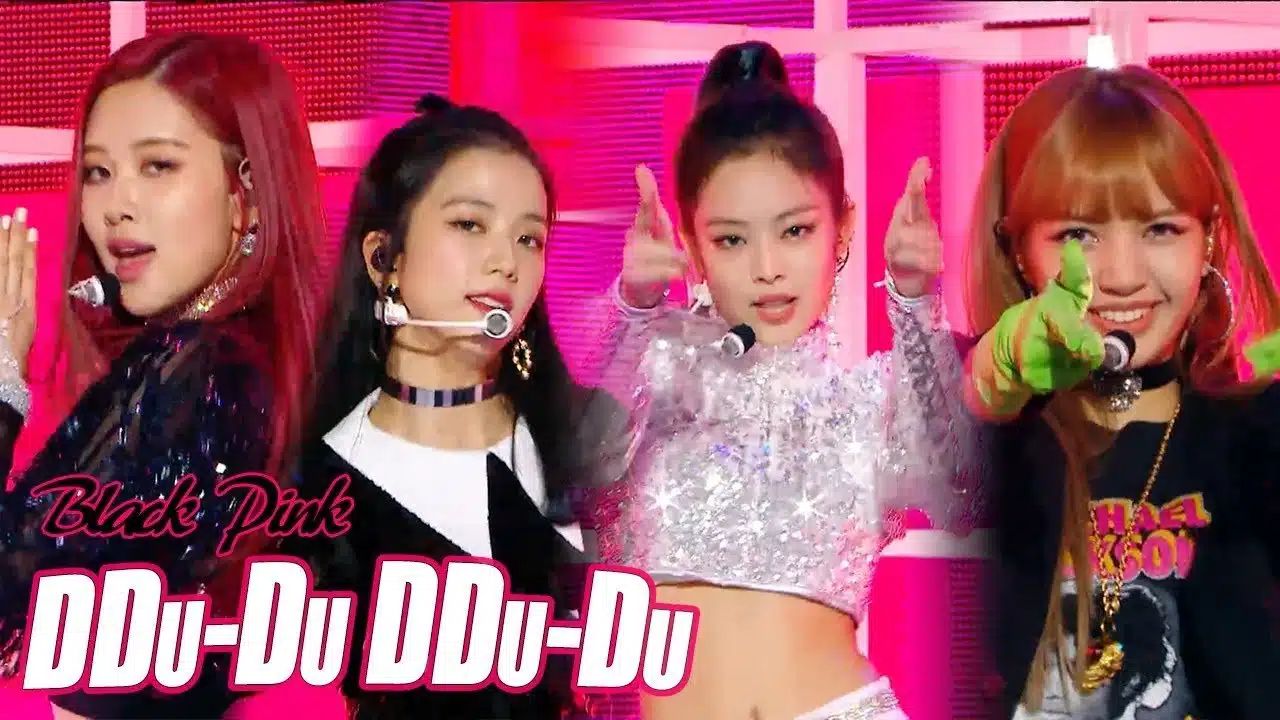
In 2018, their hit “Ddu-du ddu-du” topped the charts on its release, and the music video garnered over 30 million views in its first 24 hours, becoming the most viewed video by a Korean group in that timeframe.
Let’s take a look at these lyrics from their song “Ddu-du ddu-du”:
두 번 생각해
흔한 남들처럼 착한 척은 못 하니까
착각하지 마
쉽게 웃어주는 건 날 위한 거야
Let’s go over the meaning of the third line:
착각하지 마
(chakgakaji ma)
Don’t be mistaken
- This expression is usually used when you want to correct the belief or perception of a person you are dealing with.
- 착각하다 (chakgakada) – This means “mistake” or “delude oneself.”
- 지 마 (ji ma) – This expression comes from the polite expression 지 마세요 (ji maseyo), which is used to add negation to a request that means “do not.”
Roy Kim – 그때 헤어지면 돼 (Only then)
Roy Kim is a singer-songwriter who debuted through a popular singing competition, Superstar K. He is known to have a unique genre as he utilizes folk, ballad, acoustic, and pop in his music.

This Korean song is about a person who is in a relationship but talks about when they would know to break up. This song was covered by BTS’s Jeon Jungkook. You can see this theme in the following stanza.
Let’s take a look at this stanza from his song “Only then”:
네가 다른 사람이 좋아지면
내가 너 없는 게 익숙해지면
그때가 오면 그때가 되면
그때 헤어지면 돼
Let’s go over the meaning of the first line of the stanza above:
네가 다른 사람이 좋아지면
(nega dareun sarami joajimyeon)
If you like another person
- 좋아지면 (joajimyeon) – This word is made up of 2 words, which are 좋아하다 (joahada) and 지면 (jimyeon). 좋아하다 (joahada) means “like,” and the word 지면 (jimyeon) stands for “if” and serves as a connector.
- 네가 (nega) – This means “you.”
- 다른 사람 (dareun saram) – This means “another person.”
The second line of the stanza has the following meaning:
내가 너 없는 게 익숙해지면
(naega neo eomneun ge iksukaejimyeon)
If I get used to being without you
- 익숙해지면 (iksukaejimyeon) – This comes from the root word 익숙하다 (iksukada), which means “accustomed” or “be used to.” Again, it is added with 지면, which is a connector.
- 내가 (naega) – This means “I” or “me”
- 없는 (eomneun) – This is from the word 없다 (eopda), which means “none” or “nothing.” 는 (neun) is a particle used to designate the main idea, topic, or issue and can be attached to both subject and object.
Let’s take a look at the third and fourth lines of this stanza:
그때가 오면 그때가 되면
(geuttaega omyeon geuttaega doemyeon)
When that time comes, when that happens
그때 헤어지면 돼
(geuttae heeojimyeon dwae)
Then, we can break up
- 그때 (geuttae) – This word in this line is followed by 가 (ga), which can be used to refer to a time in the past or future. In this stanza 그때가 (geuttaega) means “at that time.”
- 오면 (omyeon) and 되면 (doemyeon) – These words are both followed by 면 (myeon), which indicates the possibility of the actions 오다 (oda), 되다 (doeda) and 헤어지다 (he-eojida) to take place.
BtoB – 너 없인 안 된다 (Only One For Me)
BTOB is a K-Pop group known for its superb vocals. The group has been active in the industry since 2012. Besides their vocals, they’re known to be gifted dancers as well. Recently, they made a comeback with the song “Only One For Me.”
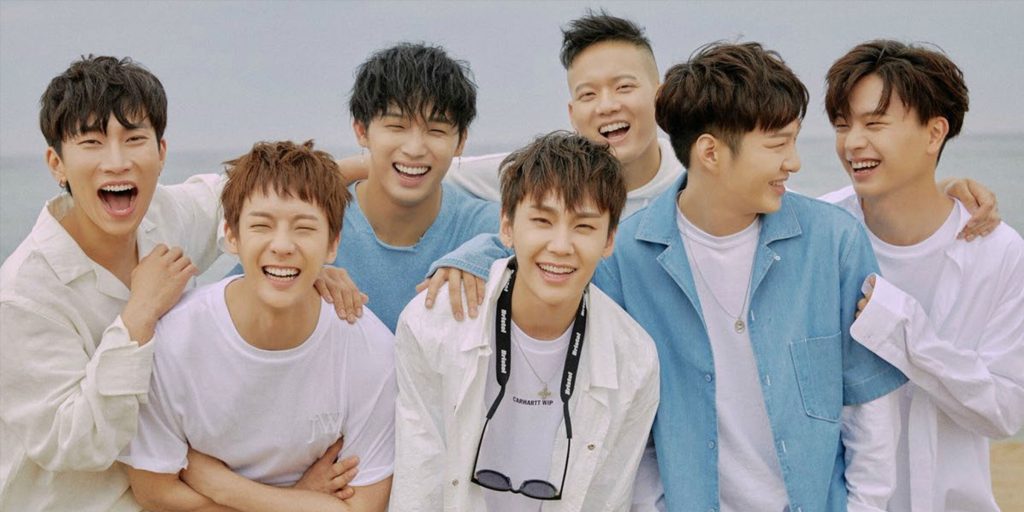
This Korean song is about a person who decides to pursue and confess his feelings toward the woman he loves. He wants to express his feelings so he won’t regret them in the future.
Let’s take a look at these lines from their song “Only One For Me”:
너 없인 안 된다 난 너여야 한다
아무리 생각해도 난 결국 너야
Let’s go over the meaning of the first line of the stanza, which is made of 2 phrases.
너 없인 안 된다
(neo eopsin doenda)
I can’t be without you
난 너여야 한다
(nan neoyeoya handa)
I must be with you
- 너 없인 (neo eopsin) – This means “without you.”
- 안 된다 (an doenda) – This is from the word 되다 (doeda), which can mean “be,” and since it is preceded by 안 (an), the phrase literally means “cannot be”.
- 난 너여야 한다 (nan neoyeoya handa) – This means “I must be with you,” where 여야 한다 means “must.”
The next line of this stanza has the following meaning:
아무리 생각해도 난 결국 너야
(amuri saenggakaedo nan gyeolguk neoya)
No matter what I think, in the end, it’s still you.
- 아무리 (amuri) – This word is used to express “no matter how”
- 생각해 (saenggakae) – This comes from the root word 생각하다 (saenggakhada)which means “think”.
- 결국 (gyeolguk) – This means “in the end” or “finally.”
Another line from their song has the following meaning:
평생을 후회하며 살 것 같아
(pyeongsaengeul huhoehamyeo sal geot gata)
I think I’ll regret it for the rest of my life.
- 평생 (pyeongsaeng) – This word means “life.”
- 후회하다 (huhoehada) is “to regret”.
- 것 같아 (geot gata) is used to express “seems like” or “to be likely to.”
Hyuna – 빨개요 (Red)
Former Wondergirl and 4Minute singer HyunA’s song 빨개요 (ppalgaeyo) moves away from the sickly-sweet image of her that listeners of her previous hit song “bubble pop” might’ve had.
Although the lyrics 원숭이 엉덩이는 빨개 (wonsungi eongdeongineun ppalgae | a monkey’s butt is red) are the most catchy of the song, you might find that particular phrase a little bit difficult to use in general conversation.
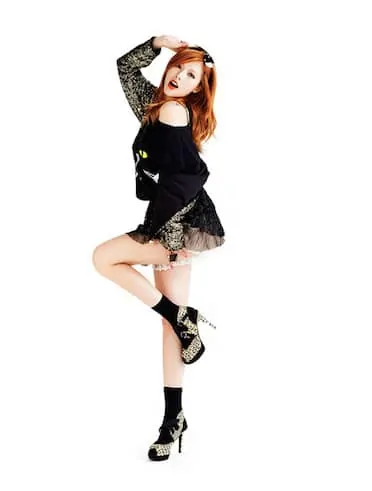
We also don’t recommend saying 혼내줄테니까 엉덩이 대 (honnaejultenikka eongdeongi dae) in public, either!
Here’s a line from her song “Red:”
날 두고 떠나지 마 나 지금 너무나 외롭단 말이야
This line is made up of 2 phrases. Let’s take a look at the meaning of these phrases.
날 두고 떠나지 마
(nal dugo tteonaji ma)
Don’t leave me/ don’t go without me
나 지금 너무나 외롭단 말이야
(na jigeum neomuna oeropdan mariya)
I’m so lonely right now
Many K-pop songs use contractions so that the lyrics fit into the song. For example 나는 (naneun) becomes 난 (nan) and 나를 (nareul) becomes 날 (nal). This is important to look out for as these contractions might not come up straight away in a dictionary.
- 난 (nan) – This word comes from the word 나는 (naneun), which can mean “I” or “me.”
- 두다 (duda) – This word means to put something down or leave something in a place (for example, 책을 책상에 두다 (chaegeul chaeksange duda)would mean to put a book on a desk).
- 떠나다 (tteonada) – This means to leave as in “to depart” (출발하다 | chulbalhada – also has the same meaning and is often used in announcements at airports or train stations instead). So 두고 떠나다 (dugo tteonada)means departing without taking the other thing with you.
- –지마 (–jima) is a shortened way of saying –지 마세요 (–ji maseyo), which means “don’t” in Korean and can be attached to the end of any verb. Often, you will hear 가지마 (gajima | don’t go) in song lyrics instead of 두고 떠나지마 (dugo tteonajima).
For the 2nd part of the line, below is the meaning of the words in it.
- 지금 (jigeum) – This word means “now.”
- 너무나 (neomuna) – This can mean “so” or “too much.”
- 외롭단 (oeropdan) – This comes from the word 외롭다, which means “lonely.”
- 말이야 (mariya) comes from 말 (mal) meaning word or speech. A common expression using it is 무슨 말이야 (museun mariya), meaning (very informally) “What did you say?”. This phrase can be heard often in Korean dramas whenever a character is surprised at the ridiculous situation that is unfolding. Used in this sentence, it is like Hyun-A is saying, “What I’m saying is I’m so lonely right now.”
Sistar – Touch My Body
Let’s take a look at this line from their song “Touch My Body”:
둘이 함께 보는 저 별들
Here’s the meaning of the line:
둘이 함께 보는 저 별들
(duri hamkke boneun jeo byeoldeul)
The stars we are looking at together

- 둘 (dul) – This word means “two” and, in this situation, could be translated as “the two of us”.
- 함께 (hamkke) – This is another word for “together” (as opposed to the more common 같이 | gachi).
- 보는 별들 (boneun byeoldeul) – This means “the stars that are seen / we can see.”
- “A” 하는 것 (“A” haneun geot) is a useful piece of grammar that means “the thing that does ‘A’”. It is used a lot in Korean, for example, “저는 운동하는 남자를 좋아해요 (jeoneun undonghaneun namjareul joahaeyo | I like guys that exercise).”
Another line from their song is:
어느 누구보다 행복해
(eoneu nuguboda haengbokae)
I’m happier than anybody
- 보다 (boda) – This is another useful word. In Korean, to say A is better than B, you can say:
“B보다A(이/가) 더 좋다 (B boda A(i/ga) deo jota)”
As you can see, the word order is different in Korean than in the related Korean expression. In this line, ‘A’ (제가 | jega) has been omitted to make the lyric fit into the song.
Another example of this piece of grammar being used with words omitted is the title of the Korean drama “꽃보다남자 (kkotbodanamja),” which translates to “Boys Over Flowers.” Fans of this drama can use its title to help them remember this piece of grammar and the word order within it.
“Touch my Body” has lots of English in it, and the words 우리 (uri | we/us/our) and 지금 (jigeum | now) come up a lot. It could be quite an easy choice to sing along to for some parts, at least.
Exo – 늑대와 미녀 (Wolf)
The wolf (늑대 | neukdae) in this song title is a word often used as slang for a guy who hits on women.
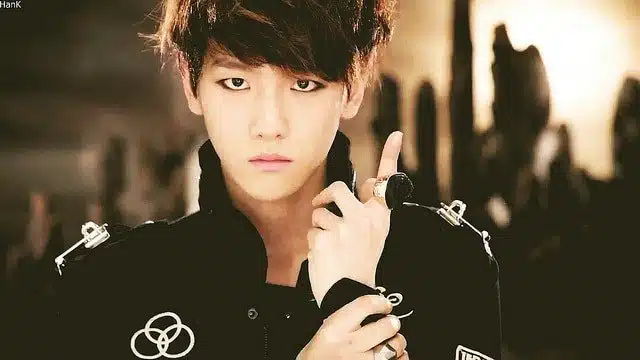
Here’s a part of a line from their song “Wolf”:
큰일 났지
(keunil natji)
He’s in big trouble
- 큰일 (keunil) – This means “problem,” “crisis,” or “trouble.” When it is used, it is usually combined with the verb 나다, meaning “to come out.”
- 나다 (nada) – This verb is used with other words like 열 (yeol | fever) and 화 (hwa | anger) to make 열이 나다 (yeori nada) and 화가 나다 (hwaga nada).
- 났다 (natda) – This is the past tense version of 나다 (nada). Later in the song, this word comes up again in the line ‘널 못 끊겠어, 큰일 났어 (neol mot kkeunkesseo, keunil nasseo)’ meaning ‘I can’t quit you, I’m in big trouble.
Miss A – I Caught Ya
Here’s a line from Miss A’s song “I Caught Ya”:
넌 미안할 자격이 없어요
(neon mianhal jagyeogi eopseoyo)
You have no right to be sorry
- 자격이 있다 (jagyeogi itda) – This is a useful phrase to learn. It means “I deserve” and can be used in many situations, such as at the end of a long day when you can say 맥주를 마실 자격이 있어요 (maekjureul masil jagyeogi isseoyo | I deserve a beer).
- 자격이 없다 (jagyeogi eopda) – This phrase means “don’t deserve.” This is the opposite of 자격이 있다 (jagyeogi itda).
As mentioned before, Kpop lyrics often use Korean in a strange way, and this song is no different, using 요 (yo)when there is no need to be polite to a cheating boyfriend. It also sounds a bit strange when compared to some of the song’s other lyrics, like 시끄러우니까 꺼져 줄래요 (sikkeureounikka kkeojyeo jullaeyo | shut up and get lost please).
4 Minute – 미쳐 (Crazy)
Let’s take a look at the following stanza from 4 Minute’s song “Crazy”:
날 보고 미쳐
(C.R.A.Z.Y) 따라 해
(C.R.A.Z.Y) 모두 다 미쳐
Here’s the meaning of the following lines:
날 보고 미쳐
(nal bogo michyeo)
Look at me and go crazy
C.R.A.Z.Y 따라 해
(C.R.A.Z.Y. ttara hae)
C.R.A.Z.Y. follow me
C.R.A.Z.Y 모두 다 미쳐
(C.R.A.Z.Y modu da michyeo)
C.R.A.Z.Y everybody go crazy
- 고 (go) – This word is used as a way of linking verbs together and means “and” in English. It is used when the two activities are not directly related.
- 서 (seo) – This is used instead of verbs or words that are directly related. For example, 친구를 만나서 놀았어요 (chingureul mannaseo norasseoyo | I met my friends and played). In these particular lyrics, either 서 (seo) or 고 (go) would be acceptable.
- 미치다 (michida | to be crazy) – This is a very popular word in K-pop lyrics.
- The rest of the chorus uses the expression 따라 해 (ttara hae), which means “follow me” or “repeat after me,” as if 4 Minute wants the crowd to shout out C.R.A.Z.Y. You can use this as it is or insert “말 (mal)” to say 따라 말 해 (ttara mal hae) which would have the same meaning.
Wrap Up
Remember, when you learn Korean with Kpop, you need to be careful because, as with Korean dramas, the language used isn’t always the most natural way to say something. Now that you know the meaning of the lyrics to these songs, you can practice while listening and try to form your own sentences. You might even get to sing these in Korean karaoke!
What K-pop songs would you like for us to break down for you next? Which songs do you think would be the most useful to use when learning Korean? Which Korean songs do you like best for studying? Or, most importantly, which K-pop groups do you think are the best? Let us know in the comments below!
For more ways to learn Korean, you can explore some apps to help you in your language journey. Best of luck!
Photo Credit: Bigstock.com

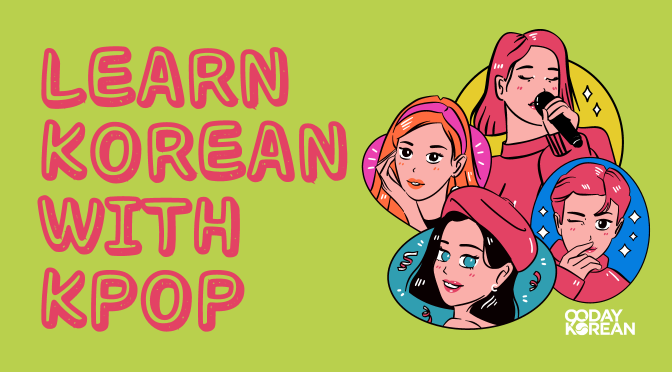


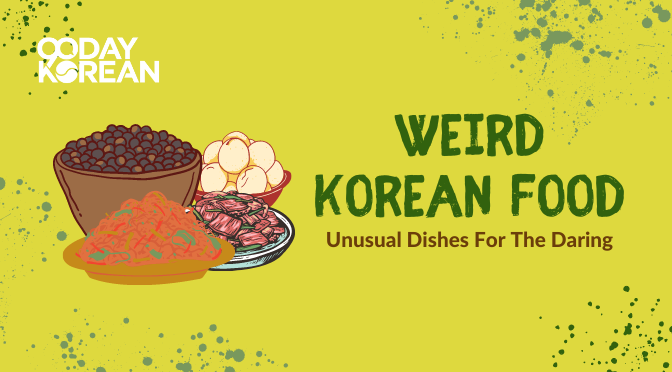

A tricky question, hopefully I can keep it appropriately polite!
I’m wondering about some of the common words that can become curse or vulgar terms in speech. I want to understand correct usage so I wouldn’t say or translate incorrectly.
It came up here with 엉덩이, which can also translate as hip or backside. Can I say my hip hurt without swearing? 😀
This reminds me also of the word 새끼.
Is this a context thing, tone of voice or is it about what particle is used? How do we use these words without offending anyone? 고마워요.
Hello! You can say 엉덩이가 아파요 for “my hip hurt”. 새끼 is a term for young animals, it can be used to call a cub, a puppy, a calf, or a baby bird. However, it becomes offensive when it’s used to call a person.
I am a recent fan of both K-Drama and K-Pop. I have become so enamored of both genres that I am learning Korean to be able to really understand them both. Some of my favorite K-Pop soloists/groups are 10cm, Gaho, Yoon Mirae and Heize – and I adore Mido and Fasol from Hospital Playlist. I especially love listening to the soundtracks from all the K-Dramas. The connection of story to music makes both so much more powerful.
Your website has been very helpful to me overall. I learned Hangul in an afternoon on your site, and I refer to your website frequently. You have so much great information there. Chongmal gamsahamnita!
Awesome, thanks for sharing. I’m glad that our website has been helpful to you, Tracy! ^^ If you want to have more Korean lessons, you can check our check our blog and visit our YouTube channel for articles and videos with great Korean content.